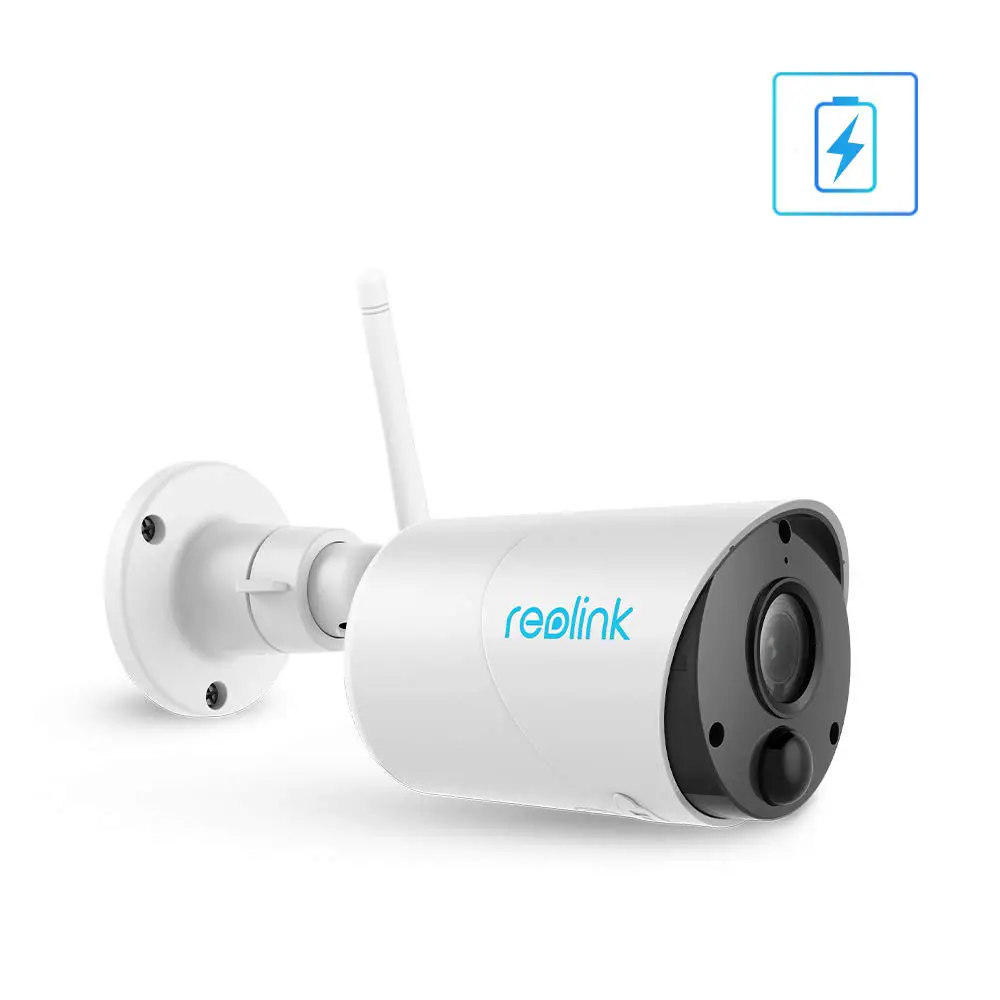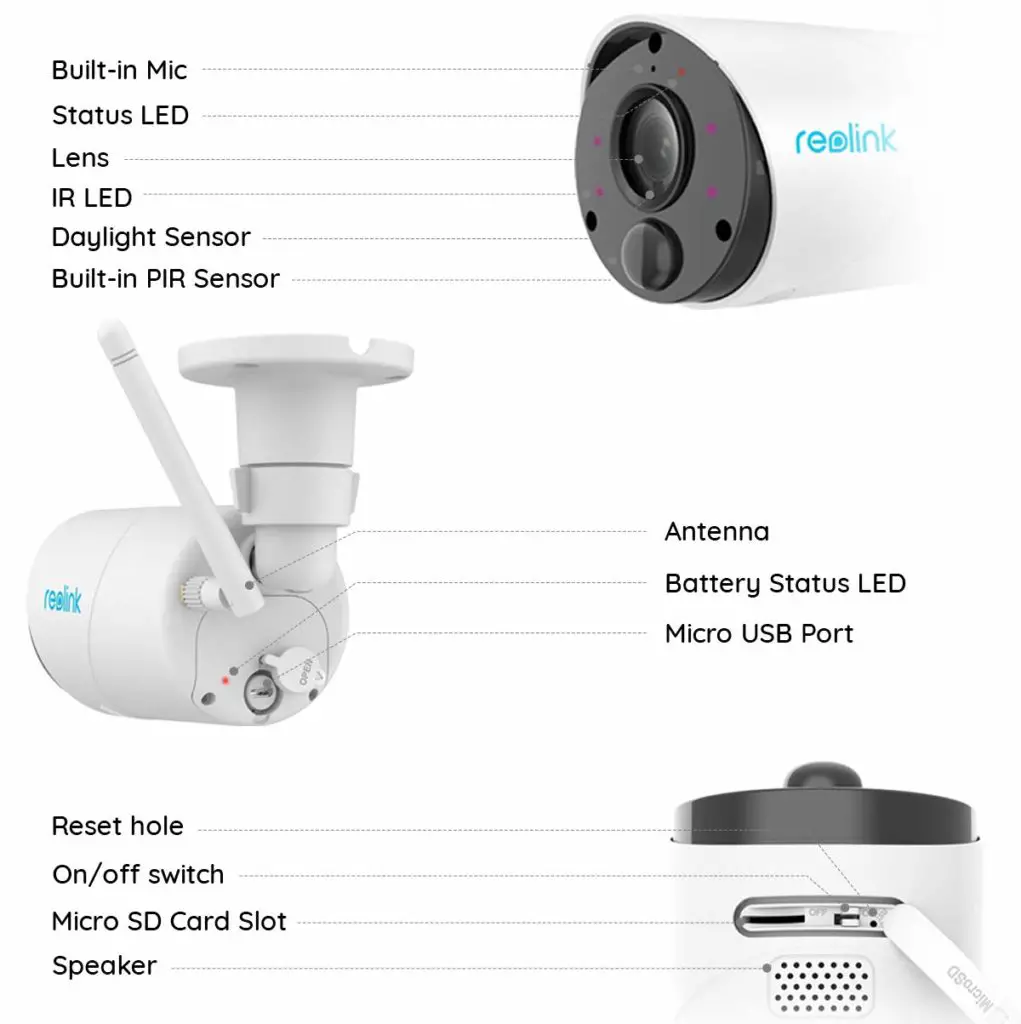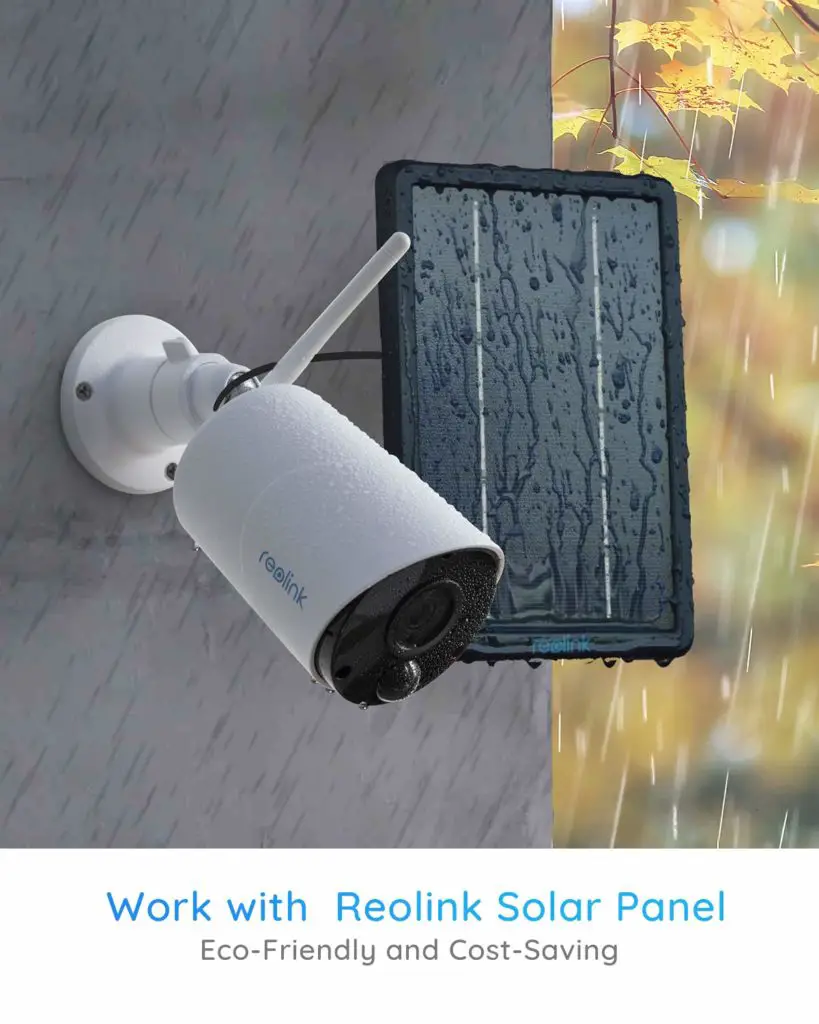
Pros
- Wire free capability
- Intelligent alerts
- Easy to install and use
- Rugged construction
- Designed to minimize false alerts
- Very affordable price tag
- High-capacity battery
- Two storage options
- Multiple powering options
- All necessary hardware is included in the package
Cons
- Non-removable camera
- Some experienced connectivity issues
For tech products, price is often used as a gauge for quality and performance as research and development cost a lot. However, it’s not an absolute truth as there are lots of affordable options that are great options as well.
The Reolink Argus Eco aims to be one of these picks with its very friendly price tag and advanced features. Not only is the price of the product friendly but its operation also will not cost you a lot. Its flexibility and versatility make it an attractive choice for an affordable outdoor security camera.
Should you give it a shot? Learn more details about this product in our review below.
Detailed Review of the Reolink Argus Eco
Design and Features

Sporting a bullet-style design, the Reolink Argus Eco veers away from the sleek and ultra-modern designs of its predecessors. Since it looks like a traditional camera with an updated sleek silhouette, it will immediately let lurkers and intruders know that your property has surveillance cameras installed. This can already deter some people with malicious intentions.
Equipped with an antenna, it promises stable connectivity so you don’t have to worry about its placement outside your house. It works with 2.4 GHz WiFi, making it easily compatible with most homes’ networks. Also on its base is its USB port for the charger and the solar panel.
On the bottom of the unit, you’ll find the speaker, MicroSD slot, and the reset buttons. On its face is where you’ll find the lens, mic and the sensor.
Setup and Usage
What makes it very easy to install is its wireless design. You don’t need to bother with cable management or electrical wiring as this device is rechargeable. To make things more painless for you, you can even hook it up to a solar panel, freeing you from the task of having to recharge the battery every so often.
Getting the camera up and running is also very simple. You just need to power up the camera, download the app, connect the two then connect the device to your wireless network and that’s it. As the app will prompt you with what to do next, the process should be quick and fuss-free.
Installing the base will require some handy skills but it shouldn’t be too much of a challenge. Thanks to the movable design of the base, you can also easily mount it in various ways. However, if you’re going to hook it up with the solar panel, you might want to check the positioning first as the cable might make things difficult.
Video Quality
The Argus Eco also comes with a 1080p resolution like its predecessors. However, when compared to the Argus 2 or Pro, there are some quality differences. The field of view is also slightly more limited in the Eco but it’s not that much of a difference. It still offers a wide coverage that’s even better than some of its competitors.
In terms of picture quality, the Eco provides clear and sharp images no matter what time of day it is. Its night vision is nice as it can reach a long distance, providing you excellent coverage of your property.
Coupled with 6x digital zoom, you’re guaranteed that you’ll be able to look closer at certain details in the video that you want to see.
Audio Quality
Aside from video recording, the Eco can also record audio. So if you want to get a full picture of what’s happening in your property, you can also listen in on the sounds that are being made on the other end. The sounds are clear and crisp, so you’ll be able to tell what is happening.
Adding more functionality to this device is its 2-way audio. It will let you talk with the person in front of the camera or speak through the camera to let the other person know that you’re watching the camera’s feed. It’s a pretty common feature nowadays but the Argus Eco takes it up a notch with its ability to record audio. With this, you don’t even have to speak through the app anymore, you can just tap on the app or set it up to play when the motion sensor is set off.
Motion and Sound Detection
Unfortunately, the Reolink Argus Eco doesn’t come with a sound sensor so you’ll need to rely on movements to get the camera recording. Its PIR motion sensor, however, is designed to be more intelligent than other sensors to reduce the number of false alerts that you’ll get.
Upon detecting movement, however, it will notify you through the app and start recording. You can set how long the recordings should be.
Some folks aren’t big fans of PIR sensors, especially in the Argus line. If this held you back from getting the other items in the range, you might be glad to know that the Eco has an improved version. As a result, it picks up movement better, even though, it still requires it to move across its range.
Cloud Storage Costs
One drawback that lots of DIY cameras have is that they typically have pricey cloud services. The Argus Eco will let you avoid such as is cloud service is currently available for free. You’ll get 1GB of space for seven days of history with this plan, so if there aren’t lots of movements in your property, you won’t necessarily need more storage.
Letting you keep this device’s use free is its local storage. You can install a microSD card on this camera and you won’t need to upload your footage on the cloud anymore.
However, if you want to get more storage, you can also get it by upgrading your subscription. Reolink’s cloud service is very affordable and only starts at $3.49/month or $35/year for the Standard plan. It will already give you 10GB with a 30-day history. The Premier plan, on the other hand, costs $6.99/month or $69/year for a 50GB storage and 30-day history.
They also have a Business plan that costs $10.49/month and $104/year. It comes with 100GB storage and 60-day history.
Smart Home Compatibility
At the moment the Argus Eco model works with Google Assistant, but not with Alexa. the manufacturer has promised to have Alexa support in the future releases.

Mobile Apps and Web Portals
If you’re familiar with the mobile app of the Reolink Argus, you will not feel unfamiliar with Eco’s app. It’s easy to use and has a lot of functionalities so you can tweak the camera’s settings to match its performance to your needs.
A great plus about the app is that it can be accessed by up to 10 viewers at the same time. This will make it easier for everyone in your household or team to monitor your property.
However, if you want to view the camera on your PC, Reolink doesn’t have a web portal. You can, however, download their web client so you can monitor several cameras in one place.
FAQs
Do I need to install the SD card if you plan to use cloud storage exclusively?
No, the use of local storage is optional so if you want to use cloud storage, you don’t need to buy an SD card.
How long does the battery last?
When fully charged, the Argus Eco’s battery will ideally last for 16 hours during the day and 9 hours at night with the IR LEDs in working mode. In standby mode, it can run up to 180 days This isn’t a solid measurement, however, since the camera doesn’t record continuously. So the more frequent it has to wake up and record, the shorter the battery life would be.
Does it need an internet connection to record?
Not necessarily. If you have an SD card in your camera, it will record locally once motion is detected. You just will not receive a notification and can’t stream the live feed on the app.
Does it come with the solar panel?
No, the solar panel is sold separately.

Conclusion
Despite being the more affordable member of the Argus line, the Reolink Argus Eco can still be a good choice for those who are looking for a no-frills and affordable choice. Its performance is up to par with the other items in the line but with a friendlier price tag, so it could easily be the perfect pick for many.